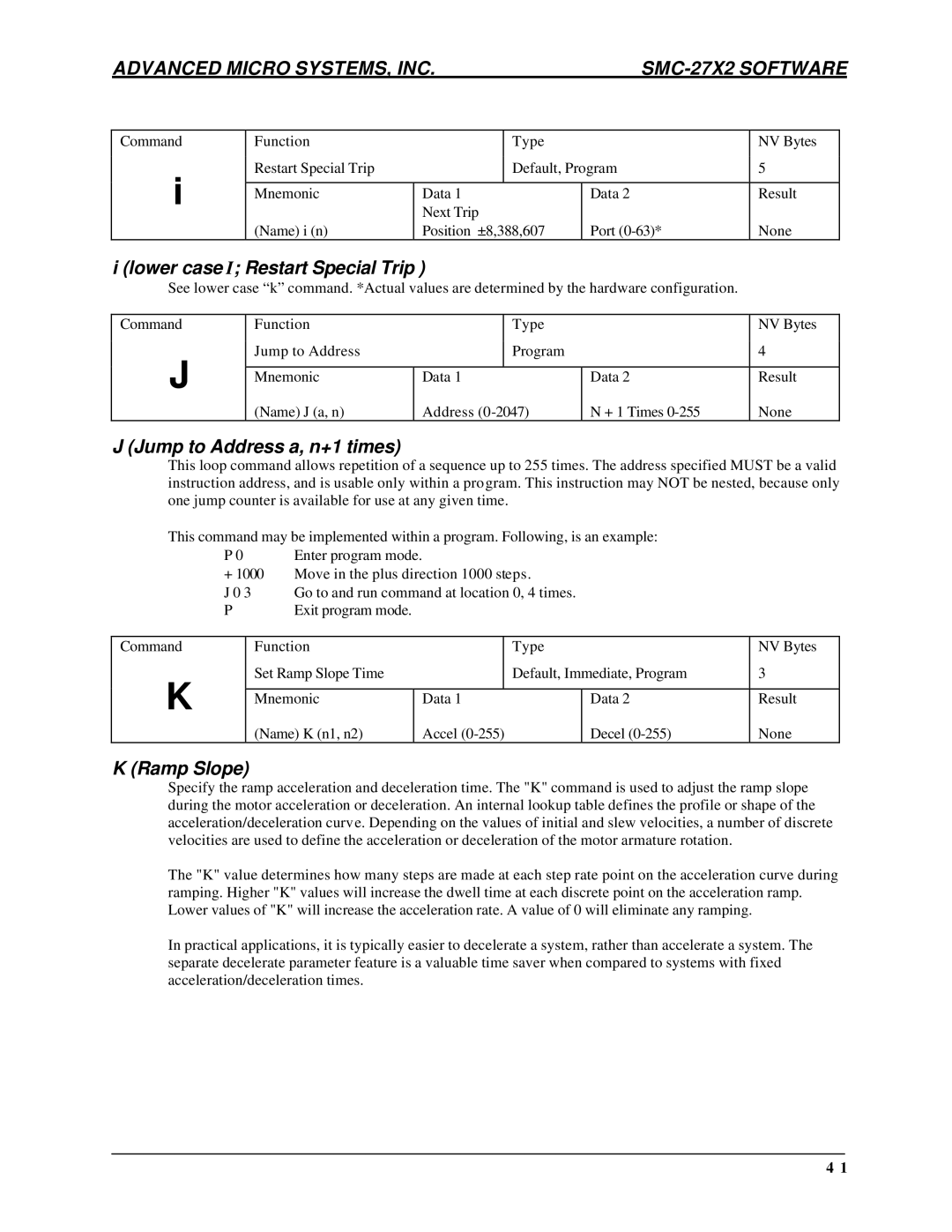ADVANCED MICRO SYSTEMS, INC. |
| |||||
|
|
|
|
|
|
|
Command | Function |
| Type |
| NV Bytes |
|
i | Restart Special Trip |
| Default, Program | 5 |
| |
|
|
|
|
|
| |
Mnemonic | Data 1 |
| Data 2 | Result |
| |
|
|
| ||||
|
| Next Trip |
|
|
|
|
| (Name) i (n) | Position ±8,388,607 | Port | None |
| |
i (lower case I; Restart Special Trip )
See lower case “k” command. *Actual values are determined by the hardware configuration.
Command | Function |
| Type |
| NV Bytes |
J | Jump to Address |
| Program |
| 4 |
|
|
|
|
| |
Mnemonic | Data 1 |
| Data 2 | Result | |
|
|
|
|
| |
| (Name) J (a, n) | Address | N + 1 Times | None | |
J (Jump to Address a, n+1 times)
This loop command allows repetition of a sequence up to 255 times. The address specified MUST be a valid instruction address, and is usable only within a program. This instruction may NOT be nested, because only one jump counter is available for use at any given time.
This command may be implemented within a program. Following, is an example: |
| ||||||||
P 0 |
| Enter program mode. |
|
|
|
|
| ||
+ 1000 | Move in the plus direction 1000 steps. |
| |||||||
J 0 3 |
| Go to and run command at location 0, 4 times. |
| ||||||
P |
| Exit program mode. |
|
|
|
|
| ||
|
|
|
|
|
|
|
|
| |
Command |
| Function |
|
| Type | NV Bytes | |||
K |
| Set Ramp Slope Time |
|
| Default, Immediate, Program | 3 | |||
|
|
|
|
|
|
|
|
| |
| Mnemonic |
| Data 1 |
| Data 2 | Result | |||
|
|
|
| ||||||
|
| (Name) K (n1, n2) |
| Accel |
| Decel | None | ||
K (Ramp Slope)
Specify the ramp acceleration and deceleration time. The "K" command is used to adjust the ramp slope during the motor acceleration or deceleration. An internal lookup table defines the profile or shape of the acceleration/deceleration curve. Depending on the values of initial and slew velocities, a number of discrete velocities are used to define the acceleration or deceleration of the motor armature rotation.
The "K" value determines how many steps are made at each step rate point on the acceleration curve during ramping. Higher "K" values will increase the dwell time at each discrete point on the acceleration ramp. Lower values of "K" will increase the acceleration rate. A value of 0 will eliminate any ramping.
In practical applications, it is typically easier to decelerate a system, rather than accelerate a system. The separate decelerate parameter feature is a valuable time saver when compared to systems with fixed acceleration/deceleration times.
4 1
